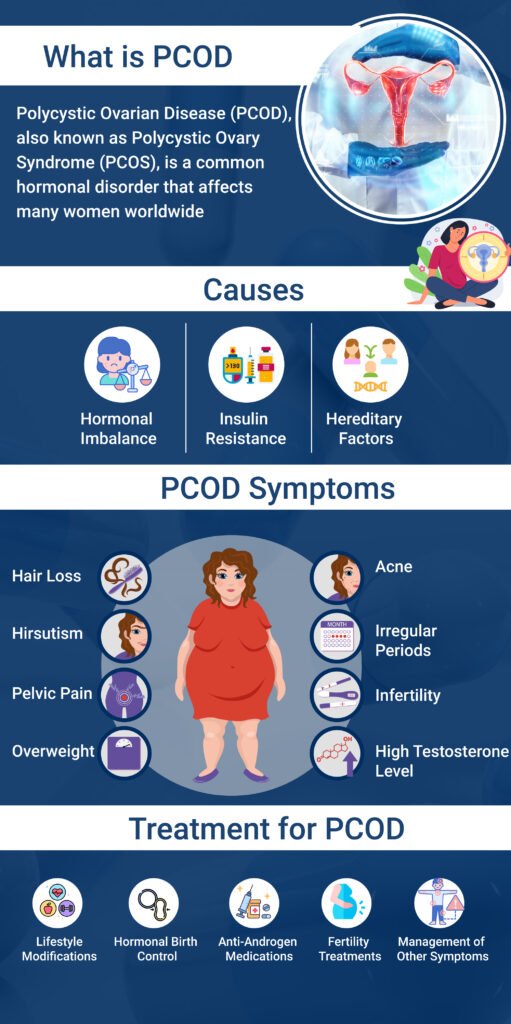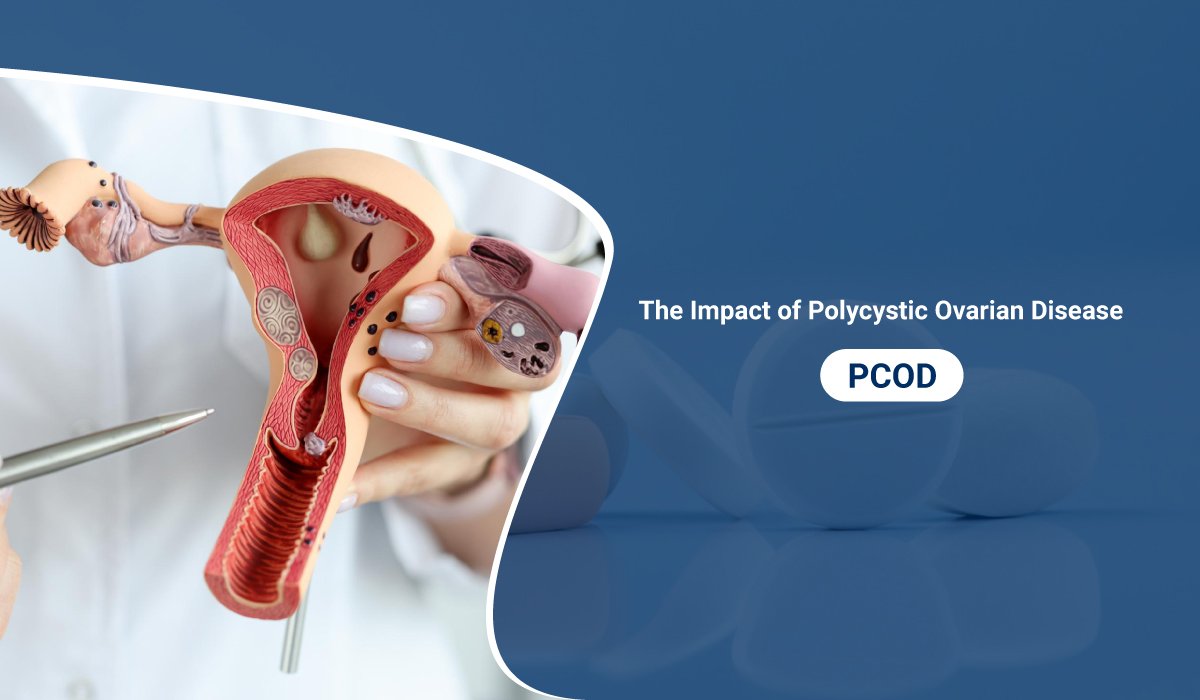Polycystic Ovarian Disease (PCOD), also known as Polycystic Ovary Syndrome (PCOS), is a common hormonal disorder that affects many women worldwide. It is characterized by a range of symptoms and can have a significant impact on a woman’s overall health and well-being. In this blog, we will explore the causes, symptoms, and treatment options for PCOD, providing you with a comprehensive understanding of this condition.
PCOD is caused by an imbalance of reproductive hormones, particularly an excess of androgens (male hormones) in the female body. This hormonal imbalance disrupts the normal functioning of the ovaries, leading to the formation of multiple small cysts on the ovaries. While the exact cause of PCOD is not fully understood, several factors, including genetic predisposition and insulin resistance, are believed to play a role in its development.
The symptoms of PCOD can vary from woman to woman and may include irregular menstrual cycles, excessive hair growth (hirsutism), acne, weight gain, and fertility issues. Women with PCOD may also experience mood swings, depression, and sleep disturbances, which can significantly impact their quality of life.
Although PCOD cannot be completely cured, there are various treatment options available to manage its symptoms and minimize its impact on a woman’s life. Lifestyle modifications, such as adopting a healthy diet and regular exercise routine, can help regulate hormones and improve overall health. Additionally, hormonal therapies, such as oral contraceptives and anti-androgen medications, are often prescribed to regulate menstrual cycles and reduce symptoms like excessive hair growth and acne. In some cases, fertility medications may be recommended for women trying to conceive.
In this blog series, we will delve deeper into each aspect of PCOD, exploring the causes and risk factors, the wide range of symptoms women may experience, and the various treatment options available. We will also provide practical tips and advice on managing PCOD effectively and living a healthy and fulfilling life despite the challenges it may pose.
Stay tuned as we uncover the complexities of PCOD and empower women with knowledge and resources to navigate this condition with confidence.

What is PCOD?
Polycystic Ovarian Disease (PCOD), also known as Polycystic Ovary Syndrome (PCOS), is a hormonal disorder that affects the ovaries in women. It is characterized by the presence of multiple small cysts (fluid-filled sacs) on the ovaries, along with various hormonal imbalances.
Causes of PCOD
Although the cause of PCOD is not entirely understood, it is thought to be a result of both hereditary and environmental factors. Some potential factors that contribute to the development of PCOD include:
- Hormonal Imbalance: PCOD is associated with excess production of androgens (male hormones) in the female body. The ovaries’ typical operation is interfered with by this hormone imbalance.
- Insulin Resistance: Insulin resistance, a condition where the body has difficulty using insulin effectively, is commonly observed in women with PCOD. Insulin resistance can lead to increased insulin levels, which can stimulate the ovaries to produce more androgens.
- Hereditary Factors: PCOD tends to run in families, suggesting a genetic predisposition to the condition.
PCOD Symptoms:
The symptoms of PCOD can vary from woman to woman. Some common symptoms include:
- Irregular Menstrual Cycles: Women with PCOD may experience irregular or infrequent menstrual cycles, or they may have prolonged periods.
- Excessive Hair Growth (Hirsutism): PCOD can cause excessive hair growth on the face, chest, back, or other areas of the body where men typically grow hair (due to increased androgen levels).
- Acne: Increased androgen levels can contribute to the development of acne.
- Weight Gain: Many women with PCOD struggle with weight gain or have difficulty losing weight.
- Fertility Issues: PCOD can disrupt ovulation, leading to difficulties in getting pregnant.
- Mood Swings and Depression: Hormonal imbalances in PCOD can affect mood and contribute to emotional symptoms such as mood swings and depression.
PCOD Diagnosis:
Diagnosing PCOD involves a combination of medical history assessment, physical examination, and laboratory tests. Some common diagnostic criteria include:
- Irregular or absent menstrual cycles
- Clinical signs of hyperandrogenism (e.g., excessive hair growth, acne, male pattern baldness)
- Ultrasound imaging revealed several ovarian cysts
- Exclusion of other potential causes of the symptoms
Treatment for PCOD
While there is no cure for PCOD, the treatment aims to manage the symptoms and improve overall health. The treatment options for PCOD may include:
- Lifestyle Modifications: Adopting a healthy lifestyle with regular exercise and a balanced diet can help regulate hormones and improve insulin sensitivity.
- Hormonal Birth Control: Oral contraceptives can regulate menstrual cycles, reduce androgen levels, and help control symptoms such as acne and excessive hair growth.
- Anti-Androgen Medications: Medications that block the effects of androgens can help reduce symptoms like hirsutism and acne.
- Fertility Treatments: Women trying to conceive may benefit from fertility medications or assisted reproductive techniques to induce ovulation.
- Management of Other Symptoms: Additional treatments may be prescribed to manage specific symptoms such as acne, hair growth, or weight loss.
It is important for women with PCOD to work closely with their healthcare providers to develop an individualized treatment plan that addresses their specific symptoms and goals. Regular monitoring and follow-up are essential to ensure effective management of the condition and overall well-being.
Conclusion
In conclusion, Polycystic Ovarian Disease (PCOD) is a complex hormonal disorder that significantly impacts women’s health, but with the expertise and Best Endocrinologist Dr. Moxit Shah, a distinguished specialist in gynecology and reproductive health, effective management is within reach. Dr. Shah emphasizes the need for personalized treatment plans, considering individual symptoms and goals. His extensive knowledge and experience enable him to tailor treatment options that address the specific needs of women with PCOD. By incorporating lifestyle modifications such as healthy diet, exercise, and weight management, along with medical interventions like hormonal birth control, anti-androgen medications, and fertility treatments, Dr. Shah ensures comprehensive and effective management of PCOD. Regular monitoring and follow-up under Dr. Shah’s guidance allow for adjustments and optimized treatment outcomes. Through his expertise and compassionate care, Dr. Moxit Shah empowers women to take control of their PCOD, providing them with the tools to lead healthy and fulfilling lives despite the challenges posed by this condition.







